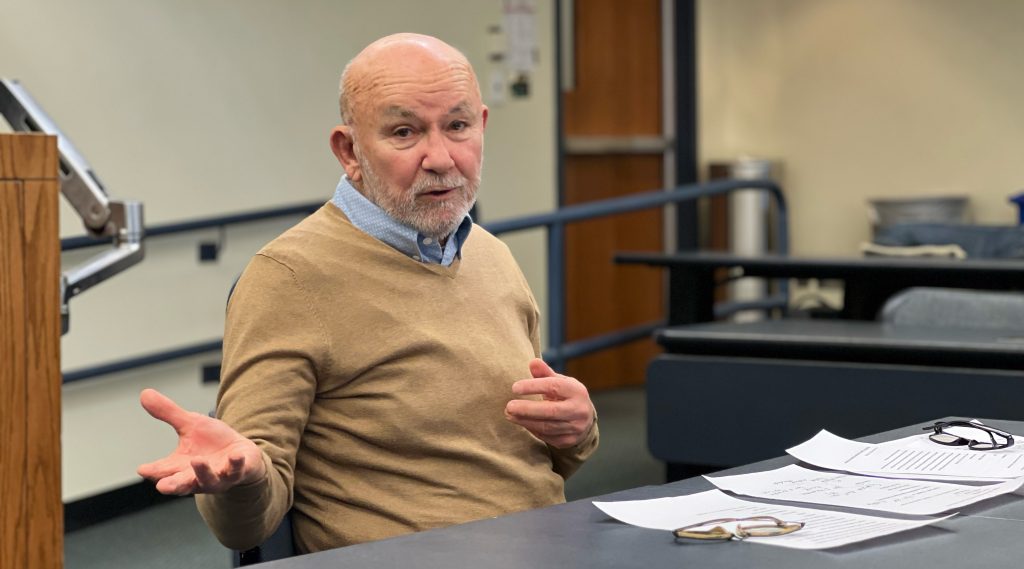At a time when the rights of LGBTQ+ Americans are being threatened across the country, John Ward is a champion for the unheard, unseen, and the misunderstood. He titled his recent talk at BC Law, “Sword and Shield: The First Amendment and the LGBTQ Community.”
LAMBDA at Boston College Law School hosted Ward, a legal scholar and activist, on April 4 to discuss modern interpretations of the Free Expression Clause and its impact on the LGBTQ community. He has spent his career fighting for the rights of LGBTQ+ individuals. He was the first openly gay man to appear before the Supreme Court, and in 1978 he founded GLAD—Gay and Lesbian Advocates and Defenders (now GLBTQ Legal Advocates and Defenders).
During his talk, Ward traced the beginnings of the LGBTQ+ legal movement, starting in the 1950’s, and brought it to the present.
“It was certainly true in those days that if you stuck your head out it was likely to be chopped off. Nevertheless, despite the repression that heightened after the Second World War, the power of love and sex is powerful,” Ward said. “Things were happening in the 1950’s against incredible odds.”
The door opened in those times to self-definition through a series of Supreme Court decisions, creating “ferment” in the community. “The right to say who you were expanded quite rapidly,” Ward explained.
However, there was a struggle. When Ward founded GLAD, he wasn’t sure he would be able to get 501(c)(3) status. It was risky for a person whose sexuality deviated from the norm to make that request of the board of bar examiners.
At that time, the First Amendment served as a shield for advocates. Cases began to emerge founded on inclusion in situations and venues in which there had formally been exclusion. But gradually, opposition to the movement mounted, which Ward experienced first-hand.
In the 1990’s, Ward represented the Irish-American Gay, Lesbian, and Bisexual Group of Boston in the landmark US Supreme Court case Hurley v. Irish-American Gay, Lesbian, and Bisexual Group of Boston. Though the Supreme Judicial Court in Massachusetts told the City of Boston that it couldn’t cloak discriminatory purpose in the First Amendment, its decision was overturned by the Supreme Court.
It held that “the State Court’s ruling to require private citizens who organize a parade to include a group expressing a message that the organizers do not wish to convey violates the First Amendment by making private speech subordinate to the public accommodation requirement.” Ward said that the case has done incalculable damage and maintained that his clients had a righteous case. These cases demonstrated the way that the First Amendment could be used as a sword.
Courts and legislatures have actively used that sword. The Supreme Court’s understanding of employment protections has also been collapsing in recent years, along with the guideposts of the Establishment Clause. Various states have begun passing so-called “divisive topics” laws, which prohibit schools from teaching about present systemic racism and sexuality. Florida’s “don’t say gay” bill is being actively expanded, which prohibits discussing queer issues in schools. Ward called it an “ancient mindset.”
“I believe we can educate ourselves. Everyone I know, at least [everyone] who is queer, has some self-rejection inside that we imbibe from the culture. I believe that is also true about other disfavored groups. The reason these laws are so nefarious is because unless you talk about it, it’s not going to change. Unless we confront our own feelings, it’s not going to change,” Ward explained.
“It leaves us with your ingenuity,” he said with a nod to the audience. “Because my own deepest belief is that the call of justice and equality is stronger than the part of ourselves that differentiates in negative ways.”
Ward will be teaching a course at the Law School in the Fall of 2023 on LGBTQ+ legal theory.


